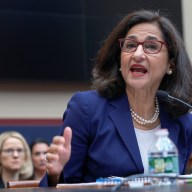VANCOUVER — Tony Des Lauriers’ ever-changing shifts as a care worker would have made it nearly impossible to volunteer during the ongoing provincial election campaign in British Columbia.
But an interesting mix of online technology and old-school electioneering lets Des Lauriers pick up the phone in his spare time from just about anywhere and convince potential voters elsewhere in the province to support the NDP on May 12.
“I always plan on volunteering, but because I am working shifts, I’ve never actually been able to get out there and do volunteer work,” says Des Lauriers, 27, who lives in Surrey, southeast of Vancouver.
“I can do it whenever I have a few minutes here and there. I just sit down and do it.”
B.C.’s Opposition New Democrats are using a tool pioneered by U.S. President Barack Obama’s election campaign, which was a huge success in large part because of how organizers were able to use the Internet to mobilize supporters.
Volunteers sign in through the party’s website, and either wait for the automated system to call their personal telephone number or they can use Skype. The computer then dials from a list of B.C. voters for the volunteer to talk to.
After that, it’s just like being in a traditional campaign phone bank, except the familiar rows of phones dotting long tables can be replaced with a coffee table and a couch.
Party president Jeff Fox says it allows supporters with busy schedules or who live in remote locations to participate in ways they otherwise couldn’t.
With the Internet fast becoming a more integral part of all election campaigns, Fox says the new phone system mixes the best of old and new.
“It is the next-generation of campaign tools, there’s no doubt about that,” says Fox.
“This is about people to people, volunteers talking to people about what concerns them in this election. It’s the oldest form of politics in the world, and we’re applying it to the newest technology in the world.”
Politicians everywhere are still figuring out how best to use the rapidly changing technology of the Internet in election campaigns.
B.C.’s two main parties, the New Democrats and the governing Liberals, have embraced the obvious social networking websites, from Twitter and Facebook to YouTube and Flickr.
Both have mailing lists that send out announcements and talking points to supporters so they can stay on message when they post to their own blogs or social-media profiles.
The Liberals ask so-called “digital activists” to donate their Facebook statuses to the party’s message on a particular issue, and the NDP wants its “rapid responders” to post the day’s talking points on their blogs.
Liberal spokesman Chad Pederson says while the party hopes Gordon Campbell’s Twitter feed is helping to convince undecided voters that may be following the premier, the real advantage is getting supporters to fan out and deliver their message through their own networks.
“For us, that’s a matter of being able to take a lawn sign off of somebody’s lawn and be able to put it onto the online community,” says Pederson.
“That allows supporters to reach out to their friends and their contacts through these social media to show their support to them.”
















